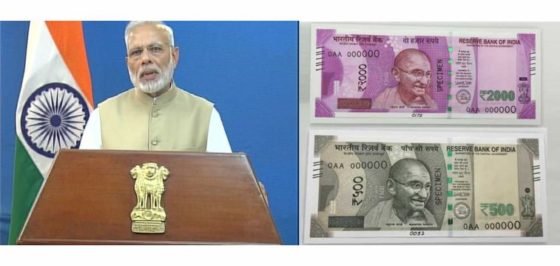Mumbai, India, November 9, 2016/Team Estrade//– In a surprise television address, Narendra Modi, Hon’ble Prime Minister of India, announced the scrapping of Rs. 500 and Rs. 1000 bills. The move is touted to be a major step for curbing the circulation of black money in the economy and a way to remove the counterfeit currency from the system. This is sure to affect all citizens and transactions across sectors. As per the Reserve Bank of India data, more than 80% value of all cash in circulation across India is dominated by Rs. 500 and Rs. 1000 bills.

Most corporate players are considering this as a hugely disruptive and game changing move by the Narendra Modi led government, and welcome it as a way to stream line transactions in the economy. While speaking to Estrade, Jason Kothari, CEO-Housing.com said, “Housing.com has always batted for increased transparency in the real estate sector and therefore, we welcome prime minister Narendra Modi’s decision to ban Rs 500 and Rs 1000 notes. Cash transactions or black money deals have plagued the sector for a long time, sometimes even accounting for up to 50% of transactions.”
Real Estate property is a high ticket item and is dominated by a mix of cheque and cash based transactions, where in some cases cash has a higher proportion. Leading to a huge discrepancy in the market prices of property and the price for which stamp duty is paid. Supporting this move, Vineet Relia, Managing Director of SARE Homes, said, “This is a very bold move taken by the Government and we truly support the decision of moving towards cash less economy. The move will have a major impact in secondary sales especially in the high value segment. At SARE we comply to the highest standards of corporate governance and feel that RERA plus this move will heap huge benefits in the long term. In the short term there will be cash flow issues and primary sales originating through migration of customers selling older family homes for new properties will get affected. This move will also enhance confidence of global investors looking at large investments in the real estate sector.”
The will surely reduce the speculation in Real Estate markets. Adding further, on how this move bodes well for the Real Estate sector, Jason Kothari, CEO-Housing.com said, “This move, combined with the Benami Property Act which became effective on November 1, will help weed out corruption and black money to a large extent, from the sector. The organised segment of the market shouldn’t be majorly impacted since most homes are now bought by end-users who avail home loans. The unorganised segment which relies mostly on cash transactions, will be impacted significantly however. While this will slow down the market in the short-term, it will make India’s real estate sector more transparent and organised in the long-term, which in turn, will attract more funds, both, domestically and internationally. This is a bold and exciting development for Indian real estate.”
Most buyers today are buying homes by way of bank loans. Majority of these housing units are in the mid-level category, where ticket size varies with respect to property’s location. Commenting on the development, Ashish Sarin, CEO, Alpha Corp said, “Hon’ble Prime Minister’s move along with bringing transparency in the sector would also be instrumental in easing up the approval process. Demonetisation of Rs 1,000 and Rs 500 notes would be instrumental in eradicating black money out from the transactions and will strengthen the banking channel as monies will get in to the banking system. There is a widespread corruption in the system and the government had to take stern measures to weed out corruption from the grassroots level. The move however would impact the unorganised real estate players and the market will see correction in the short run but in the longer run it will benefit the overall real estate sector.” He further added that the move is not going to affect his company because all their transactions are 100% legitimate.
This move has left everyone flabbergasted and is bound to distinguish companies that have been at the forefront of ethical business practices, from the ones that have been unscrupulous in their transactions. The ripple effects of this sudden development are sector agnostic. All major sectors, automobiles, education, apparel, textiles, real estate, commercial property, infrastructure sector and consumer durables are affected. While talking to Estrade, Manoj Gupta, CEO and Co-Founder, Craftsvilla, said, “This is a great move from the Modi Government. It will definitely bring about a sea of change in the way transactions are done in India. And help strengthen the economy by wiping out black money and fake notes. While e-comm companies that see a huge chunk of payments happening through Cash on Delivery mode will face some challenges in the initial few days, in the long run this move will only bring about positive changes.”
Only time will tell the final results of suddenly scrapping the Rs. 500 and Rs. 1000 bills. The Indian economy is resilient and has shown the ability to turn around and surprise the nay-Sayers throughout major global disruptions. Most corporate entities Team Estrade spoke to, were highly positive on this move and hoped that the government has thoroughly thought through this.
Rs. 500 and Rs. 1000 bills, no longer legal tender






